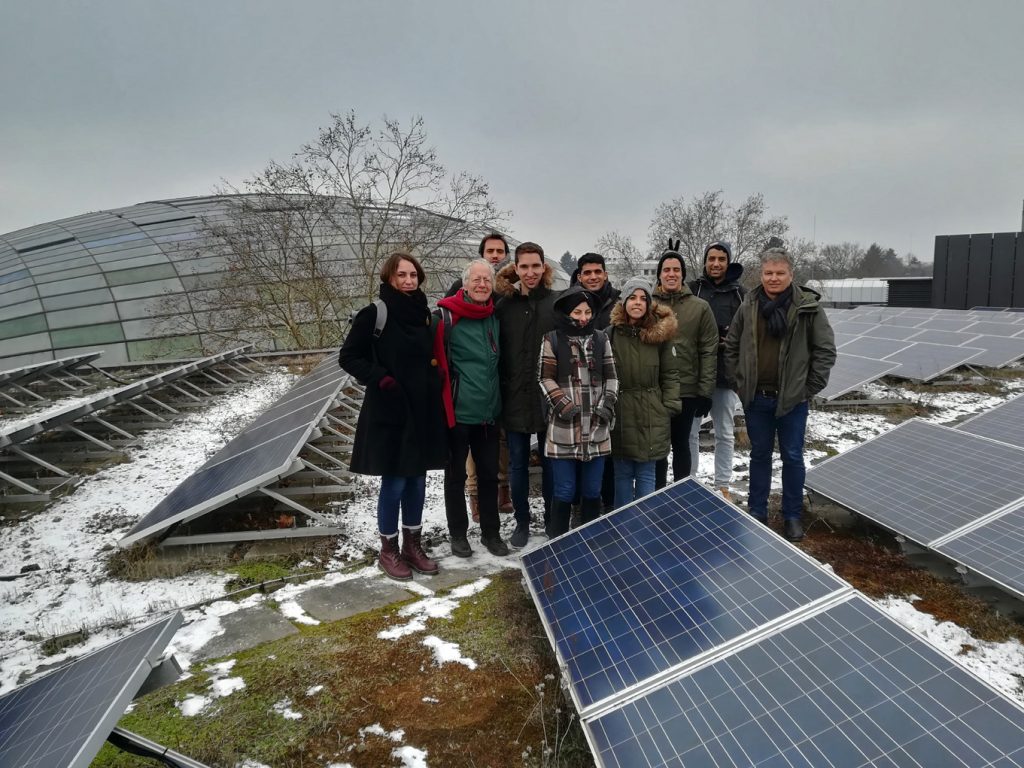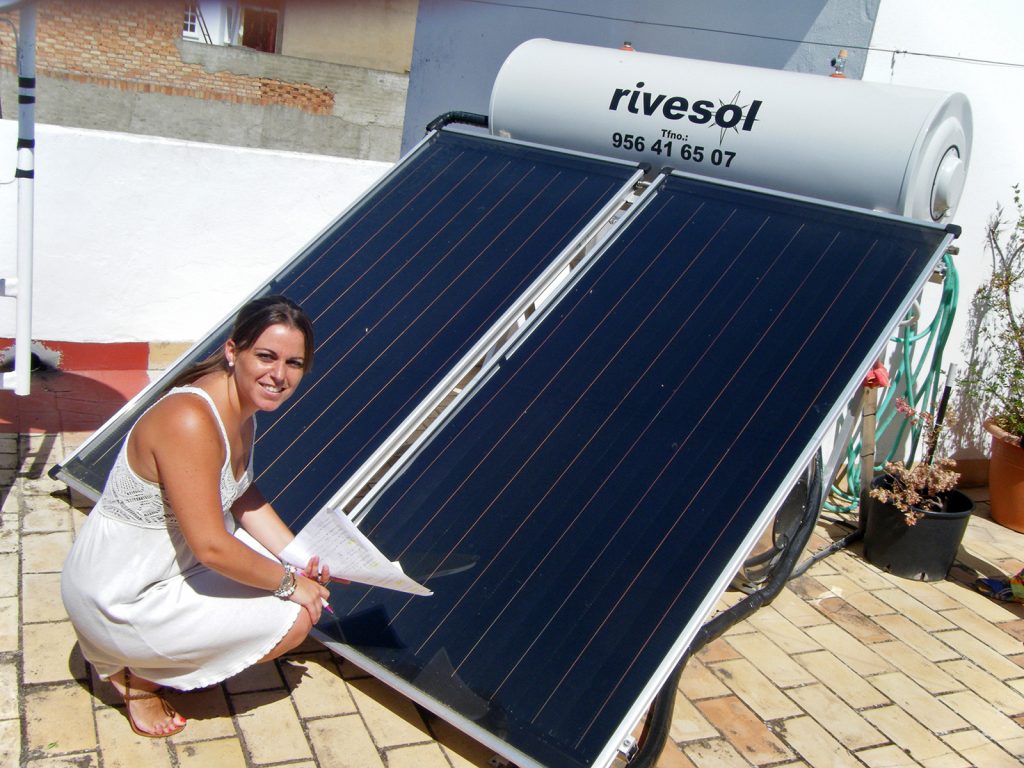A Proposal concerning the European Youth Guarantee
 1. Youth for a sustainable future
1. Youth for a sustainable future
The climate crisis does not allow a postponement of action. When the tipping points towards selfreinforcing global warming are approaching, rapid and drastic measures are called for. Not at some point or other, but here and now.
Climate protection requires commitment, but also creativity, technical know-how and qualified, hard work. Accelerating the transformation of energy systems, developing storage technologies, transforming buildings into zero energy settings or even in producing energy, for environmental sustainable towns and mobility: in each of these areas activities, know-how and the ingenuity of people who are capable to develop and implement ways and solutions to contain the global climate crisis are in demand. Beginning with energy transition, were will be demanded a high rate of qualified crafts(wo)men and engineers in the next years; and continuing with experts called for energy planning and digital control of processes. We need research for necessary technical and social innovations and we need consulting and communication tools to spread these innovations, to overcome acceptance barriers and to adapt solutions to concrete needs.
The need for qualified wo-men power extends far beyond energy-related tasks; to mention only the challenge of redesigning agriculture to be climate-friendly, protecting forests against mega-fires in drought summers, reforesting, redesigning forests, moors and wetlands , adapting cities and the countryside to the harsher circumstances of the climate crisis, and shaping the way we handle water, irrigation and rainwater in such a way that the consequences of aggravated water crises remain manageable in a different global climate.
In many regions and cities of the European Union, young people are in action, demanding climate protection “here and now”, in particular with the “Fridays for Future Movement”. In addition to the practical commitment, a great deal of technical knowledge and know-how, a wide range of new technical and interdisciplinary skills are necessary in order to successfully implement climate protection. Europe needs a huge amount of young people who are prepared and qualified for the diverse tasks of fighting against climate change. The supply of skilled workers in Europe – in other world regions as well – at present is far from sufficient for the ambitious “green new deal” we need to fight against climate crisis.
For climate protection, a Europe-wide qualification offensive in many fields of action is therefore on the agenda. How can the European Union contribute to this, after the European elections and without delay? A future-oriented qualification offensive for climate change must be supported by young people – but on average it is precisely this group that is much more excluded from the labour market. At the beginning of 2019, the EU reported an unemployment rate of 6.3%, compared with 10.6% for the age group between 20 and 29 years[1]. The discrepancy is even more pronounced in the southern European countries, i.e. in regions that are particularly hard hit by the imminent climate changes and which at the same time offer great resources in the field of renewable energies.
At the turn of the year 2018/19, youth unemployment in Greece amounted to 31.6%, in Spain to 23.8%, in Croatia to 16.6% and in Italy to 23.5%. Despite the fact that a large number of young people until now did migrate, looking for work in Northern European regions. In principle, the EU since 2013 has developed a regulating instrument against youth unemployment: the European Youth Guarantee. It obliges the Member States to offer young people between the ages of 15 and 24 either paid work in an enterprise or public institution or an apprenticeship within four months and for a certain period. After submission of implementation programs to the Commission , the countries receive funds from the EU budget. By 2018, a total of € 6.4 billion had been made available for this purpose, now the figure is €9 billion until 2020. It is obvious that this sum can only be used to alleviate youth unemployment. And if the European Commission now refers to the fact that youth unemployment ( in the age between 18 and 24 years) has decreased from 24% in 2013 to 14.6% at the beginning of 2019, this is more the result of a certain economic revival and intra-European migration.
It is not surprising, that the Youth Guarantee only had limited effects in fighting against youth unemployment. To hire young people without additional training for a minimum wage improved with public grants, invites frequently to windfall effects in enterprises. Without any economic change, the youth guarantee remains an instrument that only temporarily gives young people career prospects; or it leads to shifts in the labour market. Taken on its own, it does not open up sustainable employment prospects or new jobs. In economic sectors where there is no more work or even less work in the next future, it resembles a zero-sum game.
On the other hand, it can have a positive effect in the long term in economic sectors that will be in demand in the future and are important for the future of society. The training and work of young people should preferably be promoted and supported in such business areas and activities. Thus, we propose an extended form of the Youth Guarantee, giving at the same time strong impulses for a Green New Deal. It should include a targeted training offensive offered to all Member States in line with their youth unemployment rates:
Thus, The EU could offer young and workless citizens work training and empowerment for the subsequent search for a profession, for setting up businesses or cooperatives in occupational fields that are suitable for advancing the sustainable development of the Union. One area that is particularly suitable are activities to improve climate protection and to mitigate the consequences of global warming. We propose that the European Youth Guarantee should be extended to include an additional EU-funded programme “Youth for a sustainable future”. This offer is intended to provide young Europeans, including young refugees with residence rights, with primary or supplementary training in professions that are important and necessary for climate protection.
The training should be closely linked to practical activities and local experience, similar to the “dual model” of vocational training in Germany. The young people should also learn how to be creative in the area of climate protection and energy transition, how to set up start-up companies and funding solidarity-based economic projects. Particularly in energy transition, initiative and creativity are particularly in demand.
The financial resources available to the European Youth Guarantee are far from sufficient to achieve the declared goal of opening the way for all young Europeans to a career and adequate work. Therefore, in the forthcoming discussions of the European budget, the funds earmarked for the youth guarantee must be considerably expanded.
 In addition, the proposed educational offer “Youth for a sustainable future” requires that appropriate climate protection activities are actually tackled. However, all EU member states are bound by the Paris Convention on Climate Change, signed by the European Union in the name of all member states. The EU Commission has recently “added”, in new directives negotiated with the European Parliament and the European Council, with concrete aims and requirements to be realized by all member states in the coming years. Just to name two directives: Following the directive 2001/2018, the share of renewable energies in the EU’s total energy consumption must be at least 32% by 2030.
In addition, the proposed educational offer “Youth for a sustainable future” requires that appropriate climate protection activities are actually tackled. However, all EU member states are bound by the Paris Convention on Climate Change, signed by the European Union in the name of all member states. The EU Commission has recently “added”, in new directives negotiated with the European Parliament and the European Council, with concrete aims and requirements to be realized by all member states in the coming years. Just to name two directives: Following the directive 2001/2018, the share of renewable energies in the EU’s total energy consumption must be at least 32% by 2030.
Furthermore, the directive encharges the EU-Commission with the task to increase the share by 2023 if necessary because of an advanced climate crisis. And following the directive 2002/2018, energy efficiency must be increased by 32.5% across Europe until 2030. In view of the drama of the climate crisis, these targets are still too low; but they alone make it imperative to qualify far more than one million young Europeans in the next years to be able to participate in the restructuring of the energy supply.
Precisely the southern regions, which are affected by high youth unemployment, offer favourable conditions for the use of solar and wind energy and they also have a lot of work to do in ameliorating energy efficiency. In the coming years they will also be confronted more severely with the consequences of the deregulated climate and will have to do a great deal to limit desertification, the risk of erosion, suffering severe water crises and negative effects on agriculture. This is another reason why they need qualified young people in their own region, instead of forcing them to migrate to other European regions for being without employment in their native country.
2. A Systemic approach to a Southern European qualification offensive in the field of sustainable construction and renewable energies
2.1 Strengthening green vocational education and training and green vocational orientation in the target countries
2.2 Complementary educational services for “Young Experts” in green technical occupations
2.3 Youth without work and vocational training
3. Recommendation for action
Authors:
Dr. Hartwig Berger, Dr. Rüdiger Klatt (FIAP e.V.), Silke Steinberg (FIAP e.V.)

